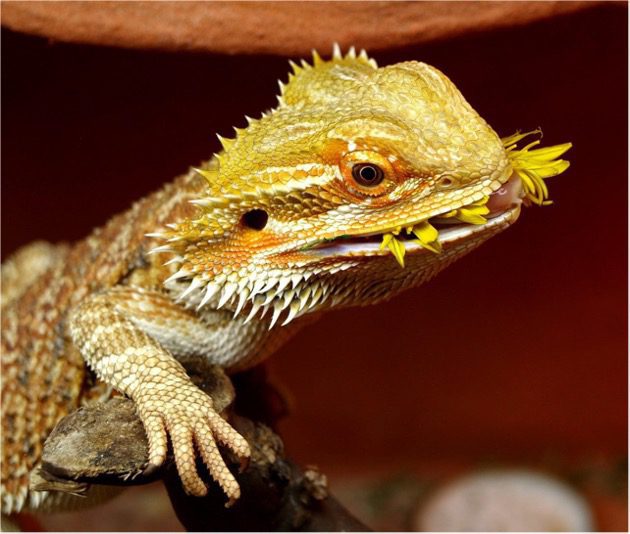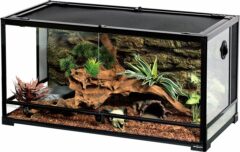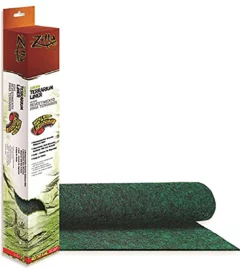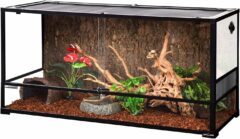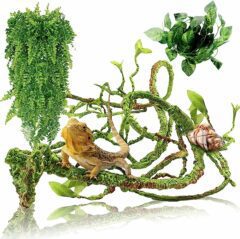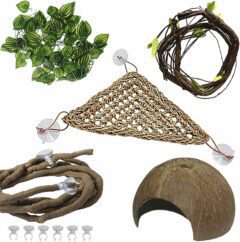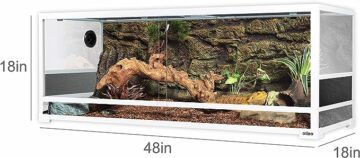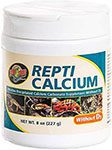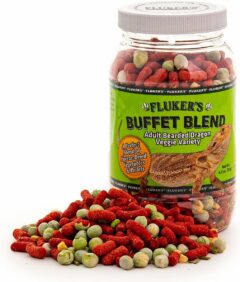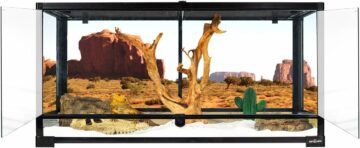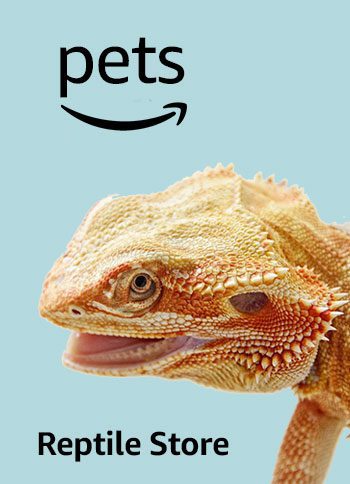Does your bearded dragon seem uninterested in their usual food? You might not know that these unique creatures can actually consume a range of vegetables. This article serves as your guide to reinvigorating their diet with an array of suitable greens and veggies. If you want to know what fruits Bearded Dragons can eat, click here.
Let’s dive in—your pet's exciting new menu awaits!
Best Vegetables for Bearded Dragons
Dandelion greens, collard greens, kale and mustard greens are some of the best vegetables for a bearded dragon's diet.
Dandelion greens
Dandelion greens are a nutritional powerhouse for bearded dragons. Their high calcium and vitamin A, K and C content contribute to their overall health.
Bearded dragons enjoy their slightly bitter taste. As they grow in many places naturally, you can easily find them outdoors but ensure they are free from pesticides or chemicals before feeding them to your pet dragon.
These leafy greens should be thoroughly washed and chopped into manageable pieces to facilitate easy consumption by your reptile friend. Offering dandelion greens frequently will help provide variety while ensuring optimal nutrition in your bearded dragon's diet.
Collard greens
Collard greens are a fantastic vegetable for bearded dragons. A dragon's overall health can be supported by the nutrients and vitamins in them. For strong bones and to prevent metabolic bone disease, these leafy greens are excellent sources of calcium.
Also, collard greens provide a good amount of fiber, which promotes proper digestion in your pet. To feed collard greens to your bearded dragon, simply chop them into small pieces and mix them with their regular diet of vegetables and insects.
Kale
Kale is another excellent vegetable for bearded dragons. They ought to eat this healthy supper since it contains calcium, vitamin A and fiber. You may blend kale with other leafy greens and vegetables to provide your dragon with a diversified diet.
Be sure to wash the kale thoroughly before feeding it to your bearded dragon to remove any dirt or pesticides. Your pet will enjoy the crunchiness of kale while benefiting from its nutritional value.
Mustard greens
Mustard greens are another excellent vegetable option for your bearded dragon. These leafy greens are packed with important nutrients to keep your pet healthy and satisfied. High in calcium, mustard greens support strong bones and proper growth.
Additionally, they contain nutrients that contribute to overall health and well-being. Including mustard greens in your bearded dragon's diet will help ensure a balanced and varied selection of vegetables for optimal nutrition.
Squash
Squash is another excellent vegetable for bearded dragons. Their overall health is reliant on the abundance of vitamins A and C, both of which are crucial. Squash is also a good source of fiber, promoting proper digestion in these reptiles.
Bearded dragons can enjoy different types of squash, including butternut and zucchini. These vegetables provide variety to their diet while offering beneficial nutrients. Remember to chop the squash into small pieces before feeding it to your bearded dragon to avoid choking hazards.
Other Vegetables Bearded Dragons Can Eat
Cactus, sprouts, sweet potatoes, parsnips, okra, cucumber and asparagus are some more veggies that bearded dragons may consume.
Cactus
Cactus is yet another vegetable that a bearded dragon may eat. It provides hydration to the reptile and offers essential nutrients. You may chop cactus into tiny, manageable pieces and remove the spines and thorns before giving it to your bearded dragon.
It's crucial to keep an eye on how your pet responds to new meals since some animals may not take cactus well or may experience allergic responses. Cactus should only be consumed occasionally as a treat rather than as a staple food.
Sprouts
Sprouts are a fantastic addition to your bearded dragon's menu. Boost your beloved pet's vitality with sprouts like radish, broccoli and alfalfa. Sprouts are packed with fiber, which helps digestion and prevents constipation. They also include antioxidants, which promote wellness and boost the immune system. To keep your bearded dragon entertained, make sure to offer them a variety of sprouts. Before feeding your pet lizard, take careful to wash its food completely.
Sweet potato
Sweet potatoes are a nutritious addition to a bearded dragon's diet. Rich in vitamins A and C, sweet potatoes provide essential nutrients for your pet reptile. The fiber in them also aids digestion.
To prepare sweet potatoes for your bearded dragon, simply cook them until they are soft, then mash them up into small pieces. Be sure to remove the skin before serving to avoid any potential choking hazards.
Offer sweet potato as part of a varied diet that includes other vegetables and insects to ensure your bearded dragon gets all the necessary nutrients it needs to thrive.
Parsnips
Bearded dragons can also eat parsnips as part of their diet. Fiber helps promote healthy digestion in these root vegetables. These treats will benefit your pet's health with their nutrients, such as vitamin C and potassium. Give your bearded dragon parsnips every day by peeling and cutting them into bite-sized pieces.
As crucial as giving your bearded dragon parsnips, it is crucial to also give them a variety of veggies. Always see a veterinarian or reptile expert if you need particular food advice for your pet.
Okra
Bearded dragons can also eat okra. This vegetable is rich in nutrients and provides your pet with vitamins and minerals. The high fiber content of okra promotes a healthy digestive system.
It also contains antioxidants that support the immune system. You can offer sliced or cooked okra to your bearded dragon as part of their balanced diet.
Cucumber
Cucumbers are another great vegetable option for bearded dragons. Moisturizing and high in water, cucumbers are also packed with vitamins, minerals and antioxidants. This is ideal for keeping bearded dragons hydrated and nourished. Remember to cut the cucumbers into manageable chunks before giving to your furry friend.
Asparagus
Chop asparagus into pieces to make it easier for your pet reptile. It's an excellent choice for feeding bearded dragons and a safe and healthy vegetable. Asparagus strengthens the immune system and promotes overall health. To support digestive health, asparagus is a low-oxalate, fiber-rich vegetable packed with essential minerals and vitamins A, C, E and K, which also prevent kidney stones.
Importance of Leafy Greens in a Bearded Dragon's Diet
Leafy greens are essential for a bearded dragon's diet as they provide high levels of calcium and nutrients, promoting proper digestion. Read more to learn about the best vegetables for your pet's health!
High in calcium
A bearded dragon's diet must include leafy greens because of their high calcium content. Calcium is essential for maintaining healthy bones and preventing disorders like metabolic bone disease.
Your bearded dragon may get the essential calcium they need to promote their general health and well-being by eating vegetables like dandelion greens, collard greens, kale and mustard greens.
Remember to offer a variety of these calcium-rich vegetables regularly to meet your bearded dragon's nutritional needs.
Nutrient-dense
Nutrient-dense vegetables are essential for a bearded dragon's diet. These veggies offer vital vitamins and minerals that support the health of your pet. Especially nutrient-dense choices are leafy greens like mustard, kale, collard and dandelion greens.
They provide your bearded dragon with calcium, fiber and other minerals that support healthy digestion and general well-being. Including these nutrient-packed vegetables in their diet will ensure they get the necessary nutrients to thrive.
Promotes proper digestion
Leafy greens like mustard, dandelion, collard and kale are great options for aiding healthy digestion in bearded dragons. These vegetables, with their high fiber content, aid in digestion and reduce the risk of constipation. Including this nutritious leafy green in your bearded dragon's diet will promote a healthy digestive system.
Additional Feeding Tips for Bearded Dragons
Offer a variety of vegetables. Avoid toxic or harmful foods and gradually introduce new foods. Ensure proper feeding portions and offer a healthy diet that includes veggies, insects and nutrients.
Offer a variety of vegetables
It's crucial to provide your bearded dragon with a range of veggies in order to ensure that they eat a balanced diet. This will not only offer various nutrients but also keep them from becoming bored and promote good eating practices.
Squash, cactus, sprouts, sweet potatoes, parsnips, okra, cucumber and asparagus are a few things to consider include in their diets. Dandelion greens, collard greens and kale are examples of leafy greens.
Maintaining the happiness and health of your bearded dragon is simple if you provide a wide variety of veggies.
Avoid toxic or harmful foods
To ensure the well-being of your bearded dragon and promote thriving, it is paramount to steer clear of any detrimental or toxic edibles. Familiarizing yourself with the forbidden foods is crucial, as ingestion of certain items might prove perilous. Make certain to abstain from citrus fruits, avocados, onions, rhubarb leaves and garlic.
These foods can cause digestive issues or even toxicity in bearded dragons. Stick to safe and nutritious options like the vegetables mentioned earlier, and always do your research before introducing new foods into their diet.
Keeping a watchful eye on their nutrition will ensure they stay happy and healthy!
Gradually introduce new foods
Bearded dragons have specific dietary needs, so it's important to introduce new foods slowly. Adding new vegetables too quickly can upset their stomachs and cause digestive issues.
Start by incorporating small amounts of one new vegetable at a time, alongside their normal and familiar vegetables. Monitor their response and make sure they tolerate the new food well before introducing another one.
This gradual approach allows their digestive system to adjust and ensures that they are getting all the nutrients they need from a variety of vegetables in a safe and healthy way.
Ensure proper feeding portions
To ensure the well-being of your bearded dragon, it is important to provide them with proper feeding portions. Bearded dragons have specific nutritional needs and overfeeding or underfeeding can lead to health issues.
To determine the appropriate serving size for your dragon, take into consideration their size and age. For the most accurate feeding suggestions, it is wise to seek guidance from a vet or a reptile expert. To prevent overfeeding, err on the side of caution and offer smaller portions to your beloved companion.
Offer a healthy diet that includes veggies, insects and nutrients
Bearded dragons require a balanced diet to maintain their health. Nutritional enhancements, flora and a delightful variety of fauna are all elements that can be discovered within this section. Tantalizing the palate is a menu that offers an assortment of flavors like squash, dandelion greens and even cacti.
To create a delightful taste, treat your bearded dragon's taste buds to a mix of greens, sweet potatoes, asparagus and okra that combine for an exquisite vegetable dish. Fully enjoy an amazing and delectable feast by indulging in an assortment of enticing and flavorful treats. Improve their overall health and aid in digestion by adding parsnips, sprouts, mustard greens and cucumbers to your daily meals. To properly aid in digestion for bearded dragons, it is recommended to include insects like crickets and mealworms. It is equally important to incorporate leafy greens that possess calcium and other essential nutrients.
It can be important to give supplements, such calcium powder or multivitamins suggested by a veterinarian, to make sure that all dietary requirements are satisfied.
Conclusion
In conclusion, a variety of veggies may be consumed by bearded dragons. Eating vegetables like cucumber and squash as well as leafy greens like dandelion and collard greens is good for their overall health.
To ensure that these wonderful reptiles have a healthy diet, don't forget to provide a variety of veggies and introduce new things gradually.

